
§ I think you should stop what you are doing and read this obit for Japanese author Kazuo Koike by Joe McCulloch. Koike, who died last week, was not just the most important writer only in manga history, but really, one of the greatest comics writers ever. He’d be in the Hall of Fame just for Lone Wolf and Cub, but he created a half-dozen (at least) other classic series, and as a teacher had a huge influence on the next generation, including Rumiko Takahashi. This is a much longer excerpt than I usually run, but McCulloch does a great job of contextualizing Koike’s amazing career – from assistant to the still living Go Nagai to comics writing sensei – in the larger picture of manga – and what made his writing so exceptional.
In 1977, Koike debuted his Gekiga Sonjuku, an educational program for instructing aspirant creators. “I do not believe creating the story from the outset is a good way to begin,” Koike stated in a 2016 Reddit AMA. “I teach about how to create a good character.” This method of conceptualizing comics — of devising characters first, delineating their motives and allowing the story to dictate itself around the conflict of those motives — accommodates the rollicking, improvisational nature of Koike’s serials, which can summon machinations enough to sustain themselves for many lucrative years. Yet even to read a smaller work like Offered, a later, 1989-90 Ikegami collaboration, which concerns a gifted college athlete on a mission to discover the truth of his parentage, which involves the Sumerian king Gilgamesh and the discovery of a lost underground civilization, is to fly through a series of feverish narrative contortions; in one chapter we might learn about how to break hypnosis by pressing a needle toward your eye, while in another the heroes might establish a nudist colony by the seashore. There are not a few Ikegami-drawn comics out in English, but none of them read like those he did with Koike, which barrel ahead with rare elan, yet retain an almost subconscious cohesion, which is that of character worldview.
Among the very first Gekiga Sonjuku students to learn such lessons was Rumiko Takahashi, who soon thereafter began Urusei Yatsura , the first of her many successes. Other students included Yūji Horii, creator of the Dragon Quest video game series; Tetsuo Hara, artist of the boys’ comics superhit Fist of the North Star; Keisuke Itagaki, creator of the still-running Grappler Baki fighting comics franchise; and Naoki Yamamoto, artist of disquieting, sexually-charged serials, and supervisor of the offbeat porn magazine Manga Erotics F. The program initially closed down in 1988, but revived itself periodically throughout the 21st century, as Koike authored numerous books espousing his character theories; none are available in English.
I’d never read of Koike’s theories, but I sure would love to read some of those untranslated books on how to write a character. Part of Long Wolf and Cub’s enduring appeal is its serial yet repetitive nature, the very essence of serialized comics. We know who Ogami and Daigoro are, and their situation, and from this simple motivation endless tales are spun, some with the basic story structure of an episode of Gunsmoke, but always effective. It’s a tradition that Stan Sakai carries on in Usagi Yojimbo, and it’s quite old-fashioned for comics, where the HBO mini series format is now the norm – but there’s no better way to create a lasting character.
§ David Brothers wrote the obit for the other manga great who recently passed, Monkey Punch, at The MNT.
Born in Hokkaido in 1937, Kato’s most popular claim to fame in both the United States and Japan was Lupin the Third, which began life as a comic in Weekly Manga Action magazine in 1967 before the launch of its first television animation in the early ’70s. The series told the story of Arsene Lupin III, the world’s greatest thief and grandson of Maurice Leblanc’s Arsene Lupin. Lupin, Fujiko Mine (a femme fatale), Goemon Ishikawa XIII (a samurai), and Daisuke Jigen (a gunman) engage in high-stakes heists all around the globe while being chased by Inspector Koichi Zenigata, an INTERPOL agent who desperately wants to put Lupin behind bars.
§ Tangential to both of these creators, Graeme McMillan took the piss out of The Myth of Comic Book Startups as the “Next Marvel” for THR last week.
This would explain the appearance of a number of new comic book publishers over the past decade or so, as well as the rise of a particular claim that has become increasingly common: publishers whose ambition is to be the “next Marvel.” It’s a claim that is rarely stated outright by anyone at the publisher, but rather conveyed in code, with mention of the size of a publisher’s character library, or the potential for shared universe storytelling in its new line (See here, for example.) It’s an appeal not directed at readers, who respond more to story concepts or, as in the case of recent startup TKO Comics, innovative release formats; instead, it’s a subtle overture to potential investors: Get in on the ground floor while you can.
McMillan was particularly inspired by the recent news that James Murdoch, Rupert’s somewhater more progressive offspring, was investing $5 million in AWA, the new comics publisher headed up by ex Marvel masterminds Bill Jemas and Axel Alonso. I need to write my own history of the “comics to movie start up” from Tekno Comics on, through Virgin, Radical, and so many more. Of course, no one can be “the next Marvel” unless they have 80 years to spare to build up a warchest of content, but it’s a nice buzzword.
Yet $5 million will buy a lot of comics at today’s prices. It’s kind of a necessary part of the comics economy these days, like variant covers: something of a con game, but the children will eat.
§ But speaking of eating, while all this goes on, actual comics creators are turning to crowdfunding to pay their medical bills because Americans have a deep antipathy for people who get sick. Here are three good people who may deserve your support:
• Michael Mantlo, brother of Rocket Raccoon creator Bill Mantlo, has run out of money to pay for his personal bills run up while caring for his brother, and is seeking funds to get him outpatient status. Bill Mantlo was struck by a car 27 years ago and suffered irreparable brain damage.
My brother remains stable, and thanks to the compensation he has, and will continue to receive for the outstanding work he did, he is in no financial peril. As for me, being retired and living on a fixed income, this ordeal has become a financial nightmare. I have nearly bankrupted myself. I have been playing credit card roulette in order to finance everything I’ve done, and now it has overwhelmed me. I am nearly $100,000 in debt, and the piper is demanding payment.
It’s worth noting that what Michael seems to be referring to here is Marvel/Disney supporting Bill’s healthcare, as reported here. However, the security of caregivers is rarely taken into account, and Michael Mantlo deserves our help.
• Artist Joyce Chin had an unimaginable disaster occur: on her way to C2E2, she suffered a stroke at O’Hare Airport and had to be hospitalized far from home. She’s seeking help with the bills from her two-week hospitalization.
• Artist Matthew Clark has suffered many health ills in recent years, and faces more problems with his heart and eyesight. His modest ask has already been met, but he’ll need more.
§ Catching up on stuff from my backlog, someone at The Verge attempted Webcomics: an oral history, which…well that would be 1000+ pages right? Luckily this version escapes from the Penny Arcade orbit that kept much of the early webcomcis narratives spinning, and recognizes some of the early hot spots:
I was really into the Keenspot community, which combined forums and free hosting for webcomics. It was run by Chris Crosby, who did Superosity. By the time I started Octopus Pie, I already had a lot of friends in webcomics who were chomping at the bit to link to my work.
— Seth Rogen (@Sethrogen) April 8, 2019
§ We haven’t really talked about this, but Preacher’s fourth season will be its final one. The fact that they made a Preacher TV show is still mind-boggling enough for me.
§ San Diego Comic Con has been rolling out its guest announcements. Chris Ware is a big one here. Mark Evanier also notes that a big hotel tax is being contemplated to fund the still not dead convention center expansion. I need to do a deep dive into this, not honestly…let the thing die. Comic-Con is shrinking a bit and the facility will never be big enough for everyone who wants to go.
§ Cartoonist Cathy Guisewaite’s book of essays is out this month, and she’s been doing many interviews.
“I wanted a career,” Guisewite says. “I wanted my independence. I wanted to put off marriage and children, and have my own success. But I also really wanted a boyfriend. You know? I was in my mid 20s. I wanted someone to love me.” Guisewite found humor in her own insecurities and an outlet for them in the comic strip. (For all the jokes Guisewite made over the years about her character’s obsession with food and weight, she herself is tiny.) Clearly she was not alone in feeling unsure of her footing in the new world that had been opened by feminism. Guisewite retired the comic strip in 2010 when she needed more time for her aging parents and her teenage daughter. As she commuted between the two, she began jotting down her thoughts, which is how the book got started.
§ Speaking of cartoonists, Lil Abner creator Al Capp was surely one of the most despicable. Jean Kilbourne, Ed.D., recalls her deeply unpleasant encounters with Capp in this difficult to read story. Trigger warnings for assault.
Capp told me that he liked me and thought I was an excellent writer and would be right for the job. There was just one hitch. I would have to sleep with him. A one-time requirement, he said. I said I really wanted the job and thought we could work well together but that I wouldn’t do this. He said goodbye.
What a pig.
§ In the year of Endgame and Captain Marvel, Alita: Battle Angel kind of flew under the radar, but I predict this movie will have a robust secondary life, kind of like Pacific Rim. It was sweet and exciting and had a lot of meat on its bones. And some very smart takes like this from Astrid Budgor at Unwinnable are beginning to roll out.
Alita’s “Whose body is this?” strikes at a kind of dysphoric terror. Four words, delivered offhandedly, that will raise an unavoidable specter in the minds of a certain segment of the film’s audience. J. Rosenfield’s piece on the film was the first longform writing to reckon with Alita in a transgender context; they provided a beacon in the midst of what felt like widespread dismissal of the film’s potential resonance for anyone not like its professional-critic detractors. [S]he knows that her body is wrong. This is perhaps the only thing she knows. She knows it because she doesn’t have to know it. She feels it somewhere deep within herself, some part she can’t access but only feel its reverberations thrumming arrhythmically through her mind. Rosenfield links Alita’s own burst of existential confusion to that produced in the viewer at the sight of Alita herself; the synthesis of Rosa Salazar’s broad, gleeful performance and the comprehensive effects work by Weta Digital, Framestore, and DNEG. As people gawk at Alita on the street so too does the viewer peer at the digital construct onscreen; maybe attempting to see the seams between actor and effects, maybe not.
§ Gary Tyrell has an epic minute-by-minute account of this year’s MoCCA in four parts but he didn’t tag them all that I can see. Start at MoCCA 2019, Part Four and scoll back.
§ 90s cartoon nostalgia is big time now! The Animaniacs cast is reuniting for a big concert at this year’s SDCC.
They’re zany to the max, and they’re heading to San Diego Comic-Con. Come join the Animaniacs in Concert on Thursday, July 18 at 7:30PM at Balboa Theatre. Original voice-cast stars of the iconic animated series — Rob Paulsen (Yakko, Pinky, Dr. Scratchansniff), Jess Harnell (Wakko), and Maurice LaMarche (The Brain), along with Emmy-Award winning composer Randy Rogel — will be performing many of your favorite songs from the original animated series during a live performance. And with it being Comic-Con week, they also hint that there may be some special, surprise guests making an appearance.
Details on the reboot are still scarce, however.
§ And people also remember Pepper Ann! Another cartoon very much of its time and yet germane to day’s discourse:
Pepper Ann in particular had an overtly wholesome and unique approach to the “tween” years. Twelve-year-old Pepper Ann was that loud weird kid who sang to her own tune and wasn’t, by any definition, popular. In her dreams she had an alter-ego, a superhero version of herself that we only ever see in the opening credits. I’d wondered why, as a kid, we never saw Pepper Ann’s alter-ego come to life in the show, but understanding the world at least somewhat better now, I can see that she didn’t need to come to life. Pepper Ann had plenty of struggles, plenty of moments of mortification and feeling like she didn’t belong. But she believed in herself just as she was, and carried herself without the need for anyone else to prop her up. The line “she’s her own biggest fan” in the theme song is pretty indicative of how confident Pepper Ann was in herself. She was her own superhero.


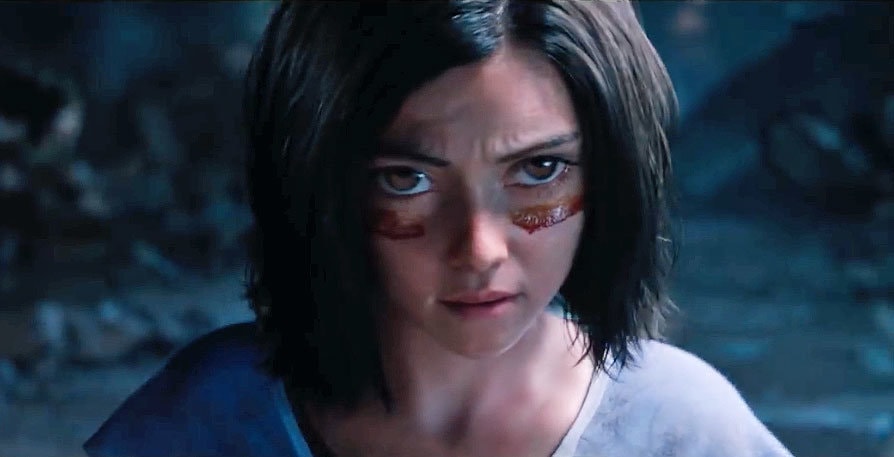

 In 1977, Koike debuted his Gekiga Sonjuku, an educational program for instructing aspirant creators. “I do not believe creating the story from the outset is a good way to begin,” Koike stated in a 2016 Reddit AMA. “I teach about how to create a good character.” This method of conceptualizing comics — of devising characters first, delineating their motives and allowing the story to dictate itself around the conflict of those motives — accommodates the rollicking, improvisational nature of Koike’s serials, which can summon machinations enough to sustain themselves for many lucrative years. Yet even to read a smaller work like Offered, a later, 1989-90 Ikegami collaboration, which concerns a gifted college athlete on a mission to discover the truth of his parentage, which involves the Sumerian king Gilgamesh and the discovery of a lost underground civilization, is to fly through a series of feverish narrative contortions; in one chapter we might learn about how to break hypnosis by pressing a needle toward your eye, while in another the heroes might establish a nudist colony by the seashore. There are not a few Ikegami-drawn comics out in English, but none of them read like those he did with Koike, which barrel ahead with rare elan, yet retain an almost subconscious cohesion, which is that of character worldview.
In 1977, Koike debuted his Gekiga Sonjuku, an educational program for instructing aspirant creators. “I do not believe creating the story from the outset is a good way to begin,” Koike stated in a 2016 Reddit AMA. “I teach about how to create a good character.” This method of conceptualizing comics — of devising characters first, delineating their motives and allowing the story to dictate itself around the conflict of those motives — accommodates the rollicking, improvisational nature of Koike’s serials, which can summon machinations enough to sustain themselves for many lucrative years. Yet even to read a smaller work like Offered, a later, 1989-90 Ikegami collaboration, which concerns a gifted college athlete on a mission to discover the truth of his parentage, which involves the Sumerian king Gilgamesh and the discovery of a lost underground civilization, is to fly through a series of feverish narrative contortions; in one chapter we might learn about how to break hypnosis by pressing a needle toward your eye, while in another the heroes might establish a nudist colony by the seashore. There are not a few Ikegami-drawn comics out in English, but none of them read like those he did with Koike, which barrel ahead with rare elan, yet retain an almost subconscious cohesion, which is that of character worldview. 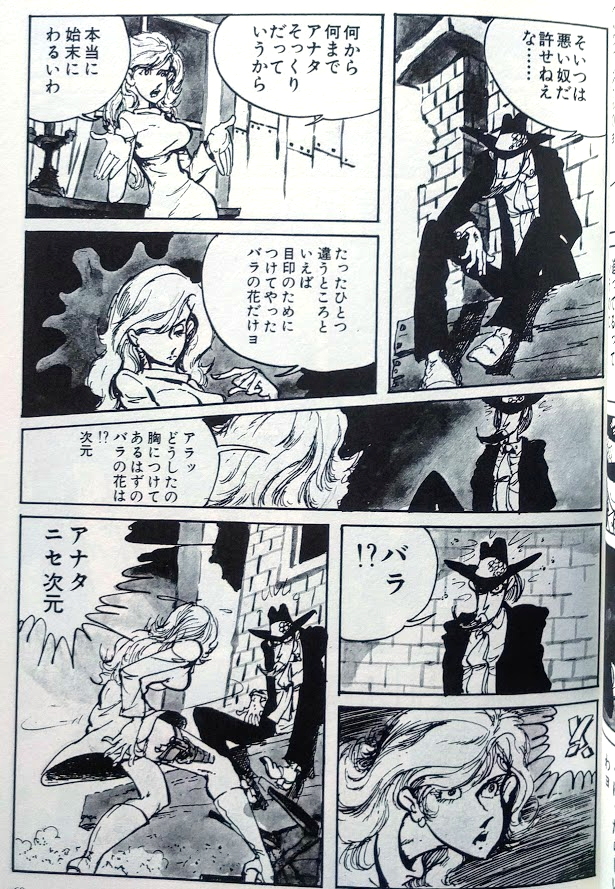
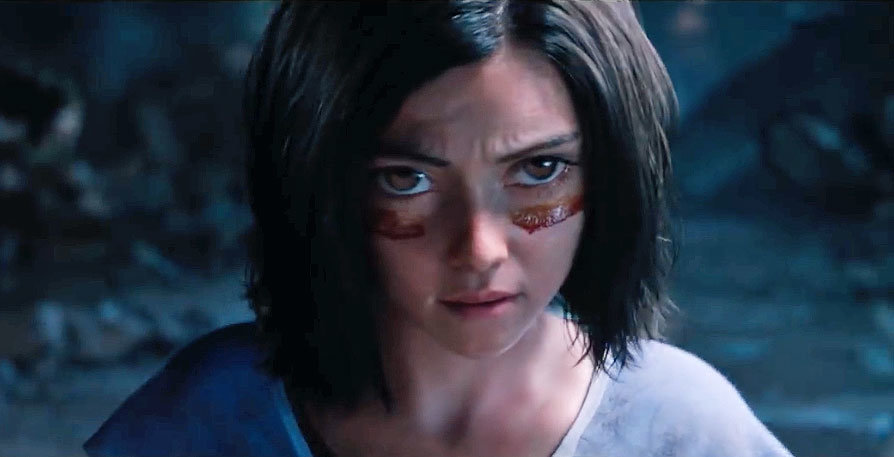
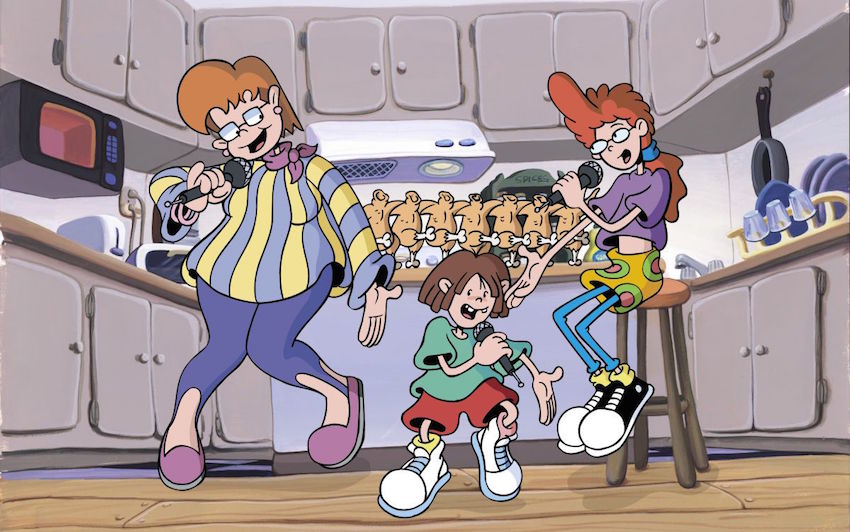
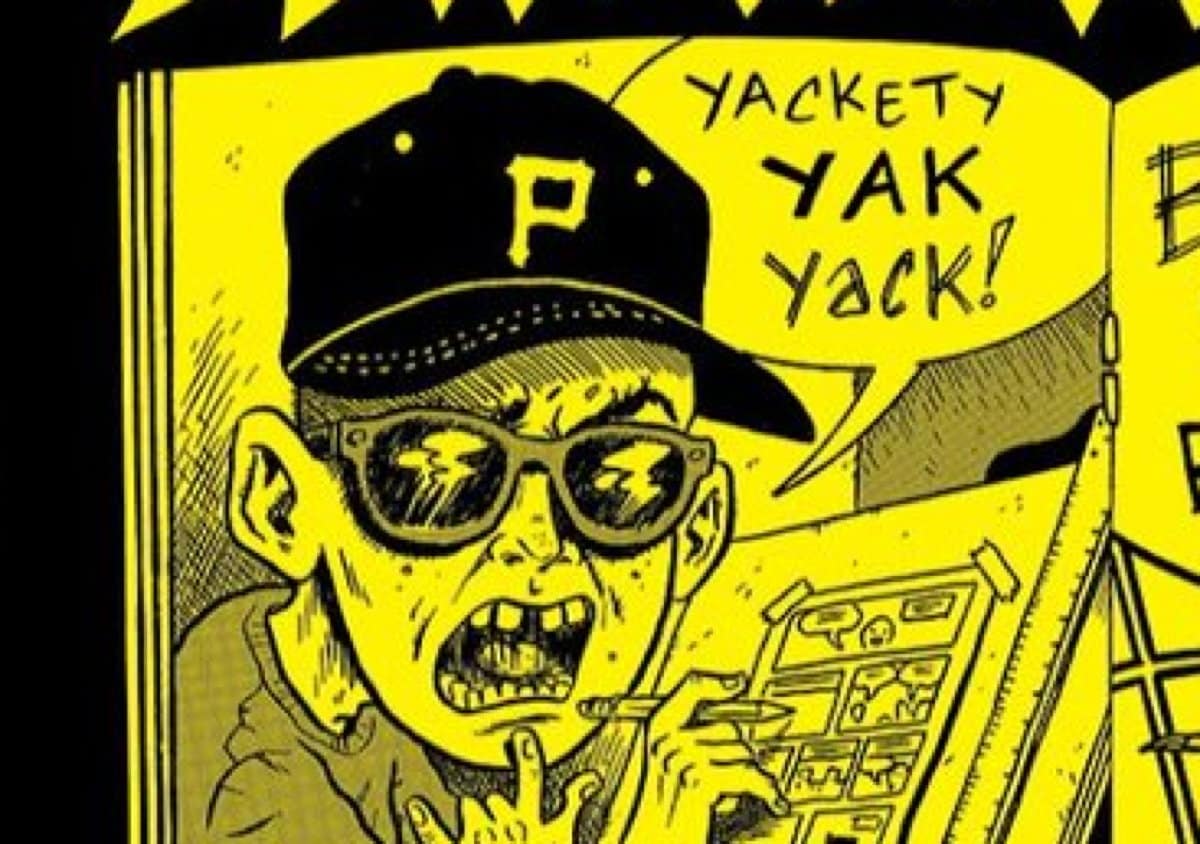
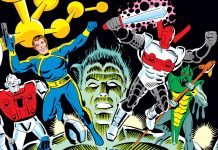



Perhaps I won’t get an answer, but what is “the scam” of the title?
Is it a reference to the Al Capp story? If so, then the word “scam” doesn’t quite fit.
Merriam-Webster defines scam as “a fraudulent or deceptive act or operation.”
You want to say Capp was an entitled pig, fine.
But I see no evidence in the story that he was deceptive. “You can write for me if you sleep with me” seems pretty straightforward, however immoral.
And actually, I think that “scam” works a whole lot of the time, rather than “never.”
I belatedly wondered if “the scam” might’ve been directed at the “next Marvel” story, but that didn’t seem to fit, since that too is a “scam” that works more often than not.
Ugh. Come in and play Devil’s Advocate all you like, Gene. Some people just have to nit-pick and rationalize things. Capp’s behavior is well established and documented, and his conduct went far beyond what this specific woman’s experience was. Who cares how ‘scam’ was used- if you ask someone to come discuss a possible business relationship and then roll out that sex is part of the process to seal the deal, yes, that is deceptive, that would constitute a “scam”.
It very very rarely works, Gene. As I will show.
I think the “scam” is the business of getting people to invest in a new comics company in the idea that it’s going to lead to big successful movies. Personally I don’t know why this should need “80 years to spare to build up a warchest of content”. People often seem to think as if the business was long ago nationalised and Marvel and DC are the Ministry of Comics.
Aren’t scams successful if they work to the benefit of the scammers, and not to that of the persons scammed?
From Wikipedia’s entry on Al Capp:
In her autobiography, American actress Goldie Hawn stated that Capp sexually propositioned her on a casting couch and exposed himself to her when she was nineteen years old. When she refused his advances, Capp became angry and told her that she was “never gonna make anything in your life” and that she should “go and marry a Jewish dentist. You’ll never get anywhere in this business.” Two biographies, one about Goldie Hawn and the other about Grace Kelly, describe Capp as trying to force Hawn and Kelly into sex.
In 1971, investigative journalist Jack Anderson wrote that Capp had exposed his genitals to four female students at the University of Alabama. Then, after an incident at the University of Wisconsin-Eau Claire, Capp was arrested. He pleaded guilty to a charge of attempted adultery, while charges of indecent exposure and sodomy were dropped. He was fined $500.
Second verse, almost same as the first:
“You want to say Capp was an entitled pig, fine.
But I see no evidence in [these stories] that he was deceptive. “
Comments are closed.